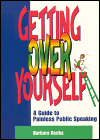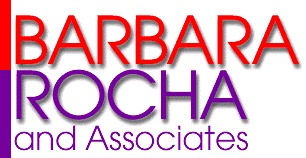 Chapter 2
Chapter 2
"Everybody Plays The Fool, Sometime"
Excerpted from Getting Over Yourself by Barbara Rocha
"I Will Survive"
Here's a piece of good news: You're not the only person who doesn't enjoy speaking in public. As a matter of fact, there are probably people in your company more anxious than you about speaking, and several in your department who are equally uncomfortable. But, just like you, they hide it.
Privately, many people contemplate loosing a primal scream, faking a coma or perhaps developing a rare tropical disease when faced with a speaking assignment.
Knowing upper management's probable reaction to this, and sensing a certain discomfort on the part of peers, few people actually unleash these emotions publicly. So, because you've never seen your co-workers acting the way you feel, you assume they don't mind speaking.
Remember those studies that show the fear of public speaking rating higher than the fear of poverty, death or total incapacity? Are people really more afraid of public speaking than of dying? Well, Howard, a student in one of our early classes, maintained that enemy fire in Vietnam scared him less than speaking in public.
But is being nervous about speaking all that bad? What about all those people who say you have to be nervous to be a good speaker? That without the nervousness, you'd be boring? It's simple: They're wrong. Should you be alive? Yes. Alert? Yes. Interested? Yes. But nervous? No.
Think about it. Aren't there activities you look forward to, that you find exciting, pleasant, enjoyable, that don't throw you into a panic? Does the thought of going water-skiing, to the theater, rollerblading, sailing or bird watching give you a spurt of adrenalin? Adrenalin and nervousness are not synonymous. So here's another reason for changing your head: Positive feelings about speaking stop nervousness and contribute energy.
"Just Direct Your Feet To The Sunny Side Of The Street"
You can make your next presentation about four times less stressful by playing a little game with yourself. I'm not usually into tricks, but this one is silly enough to be worth trying, and it really can help: When you're asked to make a presentation, say, "I'll be glad to."
Nip the fear in the bud. If you let panic or discomfort in the door, they'll take over the party. So even if you're saying "I'll be glad to" through clenched teeth, it will make your presentation easier from start to finish.
You can practice this the next time someone asks you to help with a volunteer project. Instead of drooping and droning, "Well, if you can't find anyone else, call me back," try the "I'll be glad to" approach. If you're going to say yes, do it good-naturedly. The amazing thing is that the assignment is much easier and doesn't feel like a chore. Moaning always makes it twice as unpleasant.
"Don't Let The Sound Of Your Own Wheels Drive You Crazy"
I've been nervous and I've been not nervous, and I can tell you this: Not nervous is better. I used to be darned uncomfortable whenever I was in front of an audience. I could be uncomfortable in front of three or four people if I felt they were expecting more of me than I thought I could deliver.
So what's the secret? How do you get over feeling inadequate? Let's look at a typical scenario.
You're ready to go on. Your heart is pounding, your mouth is dry, your knees are weak; you wish it was over. Suddenly, everything you've ever imagined might go wrong flashes before your eyes-that upside-down slide, that tricky word you kept tripping over during practice, the missing budget numbers.
"What if I drop the slides again?"
"What if I forget how many units we shipped last quarter?"
"What if they notice my hands shaking?"
STOP! You're losing control because you've stopped being rational. At this moment it's hard to believe you can take charge, but you can. You can stop the pounding and the terrifying symptoms.
Pause and breathe. Realize: "This isn't about me. This isn't about showcasing me. This is about telling them what happened last quarter so they can confirm our recent decisions (or recognize that we
need to alter our course)."
Keep breathing: Focus on why you're there and stop the mental stampede.
Knowing that you're in control of your focusand therefore in control of what you're thinking—builds confidence. You can think rationally while standing in front of a group. It's a big key to getting over yourself.
"When you come to a crossroads take it." — Yogi Berra
Controlling your focus means you get to choose what's going on in your head. That crossroad is the decision to be comfortable or uncomfortable when you give a presentation.
Making the right choice gives you a great feeling of power.
And you can choose to feel good about speaking.
This is a book about choices, and to put it plainly, nervousness is a choice. It's often an unconscious choice (a choice by default), but a choice nonetheless.
It's like the default position on your computer. When you turn on your computer, the default font is in place; the default margins are in place. If you don't change the default, that's what you'll have.
If nervousness is your default position before you speak, take heart. You can change that, too. Here's how: Instead of worrying about yourself and your chances of succeeding, think about 1) Why the listeners need the information, and 2) How you can help them by giving it to them.
For instance, let's say a team from your company is making a presentation to an important client in hopes of winning a big contract.
You could choose to focus on your fear of missing your cue; worry that you won't explain things clearly enough; and obsess about leaving out vital information, all of which will make you nervous and keep you from confidently presenting your information.
Or you could focus on why this audience needs the information. For instance: The client needs to make an intelligent decision that will make the buyer look good and make the shareholders, the employees, and the boss happy. Focus on showing them how using your services will make their lives easier, how happy other companies have been, and how easy your people are to work with.
You have a choice. Think about yourself and everything that can go wrong. Or think about sharing information and helping the audience. The right choice makes you invisible and highlights what your company has to offer. The wrong choice encourages them to nitpick.
One fuels fear. The other makes you comfortable.
"Have You Ever Had To Make Up Your Mind?"
Of course you have, (and it's not often easy and it's not often kind). But in this case, the easy part is that you know the result you're after: to eliminate pain. You know you're going to have to speak if you want to move up the ladder, and you know you don't want to suffer. Make up your mind to enjoy the presentation.
Make up your mind to think about all the ways this information can be useful to particular people or groups in your audience. Make up your mind to stay focused.
It's not about you.
Install a choke chain on your mind, and give it a yank when you feel yourself wandering.
"Oh, no. I gave the wrong number."
Yank!
Correct the number if you need to (without apologizing), and go on.
"Oh no. John just said what I was supposed to say."
Yank! Regroup.
"As John mentioned . . . "
"Oh no. I stumbled on the cord." Yank!
Pause. Refocus. Grin.
"That's why they have me doing presentations, instead of a high-wire act over Niagara Falls."
You have to make up your mind to focus on your message, not yourself.
"What You See Is What You Get" — Flip Wilson
I used to have to ride my bike between two posts spaced about 20 inches apart to get onto the bike path. It was a struggle every time as I tried to squeeze through that space without hitting one of the posts. Until I realized I was looking at the posts trying not to hit them, instead of at the space where I wanted to go. It's the same with speaking—you have to look where you want to go, not at where you don't.
Focus on helping the audience. Realize there are some benefits in the ideas you're expressing. There's gold in them thar thoughts, or at least there's value in them. You must appreciate their value if your audience is going to see them as worthwhile.
Look at it this way: What are the chances of giving a good presentation if you think the material is garbage? What are the chances of giving one if you think you're hopeless? What are the chances if you think the audience is too stupid to understand or appreciate what you're saying?
Guard your thinking. Control what you're "seeing." Garbage in, garbage out. Value yourself, your message and your audience if you want to connect. Because what you see is what you get.
"Keep Your Sunny Side Up"
When my brother, Dave, was in high school, my mother persuaded him (using "Mom Methods") to go to a church-sponsored party he didn't want to go to.
When he got home, she asked him if he'd had a good time. "Of course I had a good time," he retorted. "If I'm going to go, I'm going to have a good time."
Chalk one up for big brother. If I'd been the one who had to go, I'd have made sure she knew how miserable she'd made me.
Why suffer? If you have to give a presentation, choose to have a good time.
A petite businesswoman, serving as the luncheon speaker at a large Rotary Club meeting, brought her briefcase with her to the lectern, placed it on the floor and stood on it making her tall enough to reach the microphone. She got a big laugh and bonded with her male audience, making a positive out of the potential negative of being a petite woman in business.
